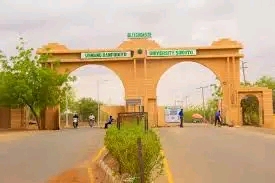By Shamsudeen Abubakar

Nura Sanusi, a 400-level Educational Foundations student, stepped out of a toilet near BO9 Lecture-hall, taking a deep breath of the warm air. He savored the atmosphere for a moment, but his expression soon turned somber, reflecting his concern about the toilet’s deplorable state.
“I couldn’t stand the smell when I entered the toilet in B09. There was urine on the ground surface and excrete in every toilet, and even in the water holes.”
“The poor condition of the toilets is the fault of the students. Most of them need to be sensitized in the proper usage of toilets,” he said.
Dahiru Naziru, a final year student of English and Literary Studies also echoed Nura’s sentiments, describing the situation in the school toilets as “horrible.”
“They are stinking with no water, and I’m not sure if the cleaners are carrying out their responsibilities,” Dahiru lamented. “You can sometimes find excrement everywhere in the toilets; on the ground, holes, without even a sign of water to indicate an attempt at flushing.”
Dahiru expressed that he wondered why some students are behaving immaturely. “Some undergraduates could sometimes be seen excreting on the ground instead of climbing the closet.”
He added that both students and the school management have a role to play in maintaining the toilets, stressing the need for students to flush the toilets properly and for the management to provide necessary water and tools for flushing 24/7.
No Choice but to Compromise
The deplorable state of the toilets has reached a breaking point , with students being forced to endure unbearable conditions due to the lack of proper facilities and chronic water shortage, leaving them with no choice but to find alternative, often unhygienic ways to manage their waste.
Raheem Hanifah, a final year student of the Educational Foundations Department said that she had learned to adapt to using toilets in various conditions, but the state she had met the toilet one day was unbearable. The smell was overwhelming, and she couldn’t bring herself to use it. “Normally, I’m not one to let toilet conditions deter me from answering nature’s call, but that day was an exception,” she said.
Hanifah complained that the lack of water in the school has exacerbated the problem. Without access to water, students are forced to use the toilets in ways that contribute to the mess. “When you can’t even use sachet water to flush, it’s a recipe for disaster.” She lamented.
She believed that students will do what they have to do when they are conditioned to use the toilet without water. The school’s chronic water shortage is leaving students with no choice but to find alternative— often unhygienic— ways to manage their waste.
Negligence and Neglect
Abubakar Maigari, a 300-level student expressed his distress over the poor condition of the toilets.
“I once entered the toilet in the B-classes and was shocked to find that all of them were damaged,” he recalled. “In the morning, the toilets are clean, but just hours later, they become unusable.”
The management has employed cleaners to maintain the toilets, but it’s up to the students to use them responsibly. Unfortunately, many students enter the toilets in haste, damaging them and wasting resources in the process.
“Most students contribute more to damaging the toilets than they realize,” he emphasized. “We all know the difference between right and wrong, but it seems we lack the values to treat our facilities with respect.”
The cleaners, who are paid to maintain the toilets, should take their responsibilities seriously and ensure the facilities are cleaned on a daily basis. Abubakar noted that it is essential to prevent the buildup of dirt, odors, and health hazards that can arise from poor sanitation.
A Different Story For Safwan
However, amidst the chaos, a Twinkle of hope emerged. Safwan Abubakar, a 300-level student of English and Literary Studies, revealed that the school library toilets were a notable exception to the general state of disrepair.
“The school library toilets are exceptional,” Safwan said. “There was water and a bucket used to flush after use. Things are totally different compared to other toilets out there in this school.”
SU— CTC Chairman Weighs In
Speaking with The News Digest Press Board UDUS, the SU-CTC. Chairman shared his thoughts on the state of the school toilets. “Everything has to be a step by step approach, he said. “Our first meeting after assuming office was that we documented issues regarding the toilet. We want to build more toilets in the school, including temporary sites,” he explained.
The Chairman acknowledged that some of the issues are not within their purview, but rather the management’s responsibility but they promise to keep putting in their best.
We have taken notice of not only the school toilets damage but also, toilets in the hostels that lack doors and others. We have tabled this to the management and are still taking these also to the V.C.
“Since the V.C is new, he’s now noticing everything and seeing how things are. But all the same, we are not graduating without doing what we have signed for,” he added.
He identified the lack of water as a major challenge contributing to the poor state of toilets. “We don’t have enough water. If we have enough, no matter how bad the odor is in the toilets, it will reduce when water is poured in it.”
He concluded that the need for students’ awareness is vital as most of the problems are from the students, using the toilets without having a sense of personal belonging that someone can use.”Students need awareness and we are working towards that.”
